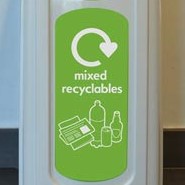Information
-
Fleet number
-
Route
-
Date
-
Driver
-
Loader 1
-
Loader 2
-
Loader 3
-
Inspected by, name:
-
Vehicle registration
-
Location
-
Signature
-
Signature
-
Signature
-
Signature
-
Route risk assessments in place?
-
Risk assessments in place?
-
Safe systems of work available?
-
Incident cards available?
-
Emergency procedures card available?
-
Fire extinguisher present, charged and in date?
-
First aid kit complete and in date?
-
Hand cleaning facilities available?
-
Are crews wearing seatbelts?
-
Is the cab interior clean and tidy?
-
No smoking in the vehicle being adhered to
The vehicles
-
Are reversing aids to provide 360 vision where necessary e.g Camera or CCTV provided and functioning to observe working area at rear of RCVs and other recycling vehicles?
-
Are reversing alarms in good working order, being used used correctly and properly adjusted?
-
Are beacons /warning lights in good working order, being used correctly and properly adjusted?
-
Mirrors in good working order, being used correctly and properly adjusted?
-
Vehicle defect sheet correctly completed?
-
Tachograph book correctly completed?
-
Does the driver carry a CPC card and licence?
-
Bin and skip hoist controls exclude operator from trapping zone?
-
Hoist compatible with the type of container and able to lift on slopes where operated?
The driver, operators and public interface.
-
Single sided collections adhered to?
-
Vehicles loaded only when stationary?
-
Collection of containers from near side kerb only, so far as reasonably practicable to reduce crossing or working within the road?
-
Riding on vehicle within cab only, no footboards?
-
Trained reversing assistants (banksmen) used when reversing in the vicinity of pedestrians ( only if the risk cannot be controlled by safer control measures, e.g CCTV?
-
Reversing avoided where possible?
-
Reversing procedure carried out correctly?
-
Reversing assistant located in a safe place?
-
Reserving assistant being alert?
-
Reversing assistant using correct signals?
-
Reversing manoeuvre carried out safely?
-
The none use of Phones, MP3 players and other audio devices not being used on collection rounds being adhered to?
Lifting and manual handling.
-
Are manual handling training techniques being used for the range of container types collected?
-
Is the vehicle ergonomically suitable for sorting / loading e.g height of rave rail, height of sorting surface, and placement of stillages?
-
Is the bin hoist/ side hopper operated safely?
-
Do crew members stand clear whilst lifting in progress?
-
Are crew members observant during the bin/hopper lift?
-
Do crew members ensure wheelie bins are not overfilled before handling?
-
Do the operatives have manual handling and needle stick training.<br>Also reversing procedure and noise toolbox talks.
-
Are operatives aware of Hep And B inoculations?
Waste receptacles - boxes/bins/bags
-
Weight check of receptacles before handling?
-
Lifting and handling technique practiced?
-
Are hazards and slippery surfaces avoided?
-
Are crew members avoiding collection spills?
-
Do crew members clean up collection spills?
-
Are boxes/bins returned to the original place and not leaving an obstruction?
-
Are crew members removing bags from bins to reduce weight?
Personal protection equipment (key issues)
-
High visibility (cat 3) clothing provided and worn?
-
Safety footwear provided and worn?
-
Protective ( ballistic ) trousers provided and worn when the risk of leg cuts e.g collecting bags or when bags are removed from other containers?
-
Gloves provided and worn when directly picking up refuse?
-
Hearing protection (ear defenders, plugs ect.) provided and worn when required?
-
Eye protection provided and worn where required?










